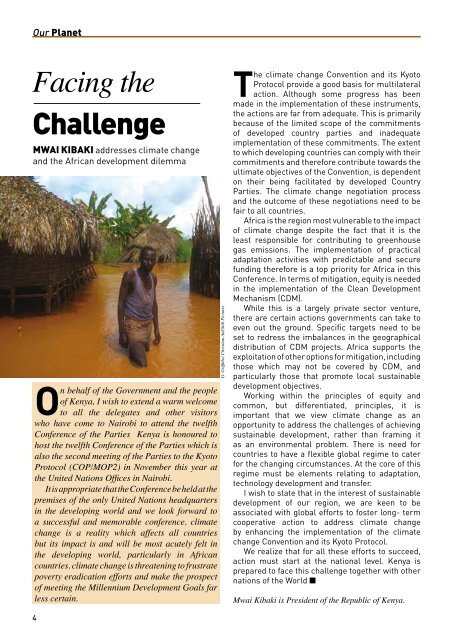UNEP Magazine "Climate change and economic development"
UNEP Magazine "Climate change and economic development"
UNEP Magazine "Climate change and economic development"
You also want an ePaper? Increase the reach of your titles
YUMPU automatically turns print PDFs into web optimized ePapers that Google loves.
Our Planet<br />
Facing the<br />
Challenge<br />
Mwai Kibaki addresses climate <strong>change</strong><br />
<strong>and</strong> the African development dilemma<br />
On behalf of the Government <strong>and</strong> the people<br />
of Kenya, I wish to extend a warm welcome<br />
to all the delegates <strong>and</strong> other visitors<br />
who have come to Nairobi to attend the twelfth<br />
Conference of the Parties Kenya is honoured to<br />
host the twelfth Conference of the Parties which is<br />
also the second meeting of the Parties to the Kyoto<br />
Protocol (COP/MOP2) in November this year at<br />
the United Nations Offices in Nairobi.<br />
It is appropriate that the Conference be held at the<br />
premises of the only United Nations headquarters<br />
in the developing world <strong>and</strong> we look forward to<br />
a successful <strong>and</strong> memorable conference. climate<br />
<strong>change</strong> is a reality which affects all countries<br />
but its impact is <strong>and</strong> will be most acutely felt in<br />
the developing world, particularly in African<br />
countries. climate <strong>change</strong> is threatening to frustrate<br />
poverty eradication efforts <strong>and</strong> make the prospect<br />
of meeting the Millennium Development Goals far<br />
less certain.<br />
G. Griffiths/ Christian Aid/Still Pictures<br />
The climate <strong>change</strong> Convention <strong>and</strong> its Kyoto<br />
Protocol provide a good basis for multilateral<br />
action. Although some progress has been<br />
made in the implementation of these instruments,<br />
the actions are far from adequate. This is primarily<br />
because of the limited scope of the commitments<br />
of developed country parties <strong>and</strong> inadequate<br />
implementation of these commitments. The extent<br />
to which developing countries can comply with their<br />
commitments <strong>and</strong> therefore contribute towards the<br />
ultimate objectives of the Convention, is dependent<br />
on their being facilitated by developed Country<br />
Parties. The climate <strong>change</strong> negotiation process<br />
<strong>and</strong> the outcome of these negotiations need to be<br />
fair to all countries.<br />
Africa is the region most vulnerable to the impact<br />
of climate <strong>change</strong> despite the fact that it is the<br />
least responsible for contributing to greenhouse<br />
gas emissions. The implementation of practical<br />
adaptation activities with predictable <strong>and</strong> secure<br />
funding therefore is a top priority for Africa in this<br />
Conference. In terms of mitigation, equity is needed<br />
in the implementation of the Clean Development<br />
Mechanism (CDM).<br />
While this is a largely private sector venture,<br />
there are certain actions governments can take to<br />
even out the ground. Specific targets need to be<br />
set to redress the imbalances in the geographical<br />
distribution of CDM projects. Africa supports the<br />
exploitation of other options for mitigation, including<br />
those which may not be covered by CDM, <strong>and</strong><br />
particularly those that promote local sustainable<br />
development objectives.<br />
Working within the principles of equity <strong>and</strong><br />
common, but differentiated, principles, it is<br />
important that we view climate <strong>change</strong> as an<br />
opportunity to address the challenges of achieving<br />
sustainable development, rather than framing it<br />
as an environmental problem. There is need for<br />
countries to have a flexible global regime to cater<br />
for the changing circumstances. At the core of this<br />
regime must be elements relating to adaptation,<br />
technology development <strong>and</strong> transfer.<br />
I wish to state that in the interest of sustainable<br />
development of our region, we are keen to be<br />
associated with global efforts to foster long- term<br />
cooperative action to address climate <strong>change</strong><br />
by enhancing the implementation of the climate<br />
<strong>change</strong> Convention <strong>and</strong> its Kyoto Protocol.<br />
We realize that for all these efforts to succeed,<br />
action must start at the national level. Kenya is<br />
prepared to face this challenge together with other<br />
nations of the World n<br />
Mwai Kibaki is President of the Republic of Kenya.

















